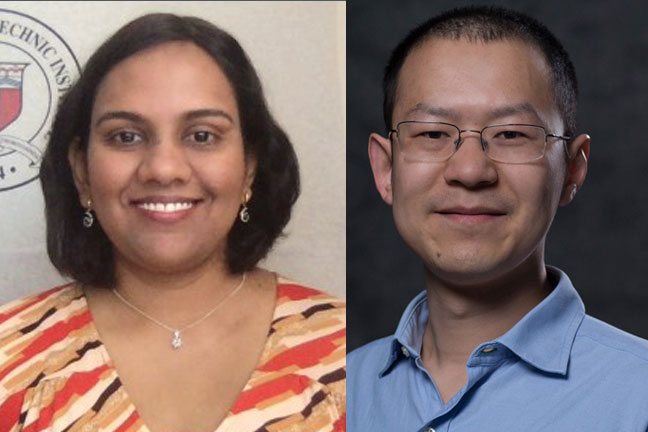August 30, 2022
Funding from the Algorand Foundation will provide new research and curriculum opportunities for students
Rensselaer Polytechnic Institute’s Oshani Seneviratne, director of health data research at the Institute for Data Exploration and Applications (IDEA), and Lirong Xia, associate professor of computer science, have been awarded $363,343 from the Algorand Foundation. The award is part of an $8 million grant to fund blockchain research through a project led by Vassilis Zikas, associate professor of computer science and security researcher at Purdue University.
The project, called Multidisciplinary Educational Global Alliance for Algorand Center of Excellence or MEGA-ACE, will advance blockchain technology and address challenges in theory and application involving economics, social choice, cryptography, and architecture. Algorand’s blockchain is distinguished by solving the so-called “blockchain trilemma” by making its technology secure, scalable, and decentralized. More than a dozen university and private sector representatives are participating in MEGA-ACE from around the globe.
At Rensselaer, students will benefit from this award through graduate and undergraduate research opportunities, special events such as hackathons conducted in collaboration with the student-led RPISEC computer security organization group, and on-campus guest presentations related to artificial intelligence (AI) and blockchain technologies by Algorand experts. Blockchain has far-reaching applications.
“With this funding, I will explore governance for blockchains and governance using blockchains,” said Xia. “My goal is to improve efficiency, fairness, and incentives for groups of people to make collective decisions.”
Seneviratne’s research through this grant will focus on smart contracts, in which the self-executing terms of an agreement are written into lines of code that will be executed on the Algorand blockchain to power next-generation decentralized applications.
“Blockchains offer the basis for cryptocurrencies and decentralized ledgers,” said Seneviratne. “However, their anticipated application goes well beyond that. Blockchain will be an enabler to improve several properties of modern large-scale networks. My research through this grant will investigate how blockchains can be used to improve secure computation toward what is often referred to as the new Web or Web3. I also look forward to programming AI-based applications using novel smart contract execution frameworks in the Algorand virtual machine with improved semantics and verification.”
Xia and Seneviratne’s research will be incorporated into the curriculum at Rensselaer.
“MEGA-ACE is a wonderful framework that will enable Rensselaer faculty and students to collaborate with like-minded researchers worldwide to advance blockchain technology,” said Curt M. Breneman, Dean of the School of Science. “Blockchain distributed ledger systems have the potential to transform the way we do business through smart contracts, decentralized finance, non-fungible tokens, as well as cryptocurrency. Rensselaer intends to be at the forefront of these developments as they change the way the world does business.”

